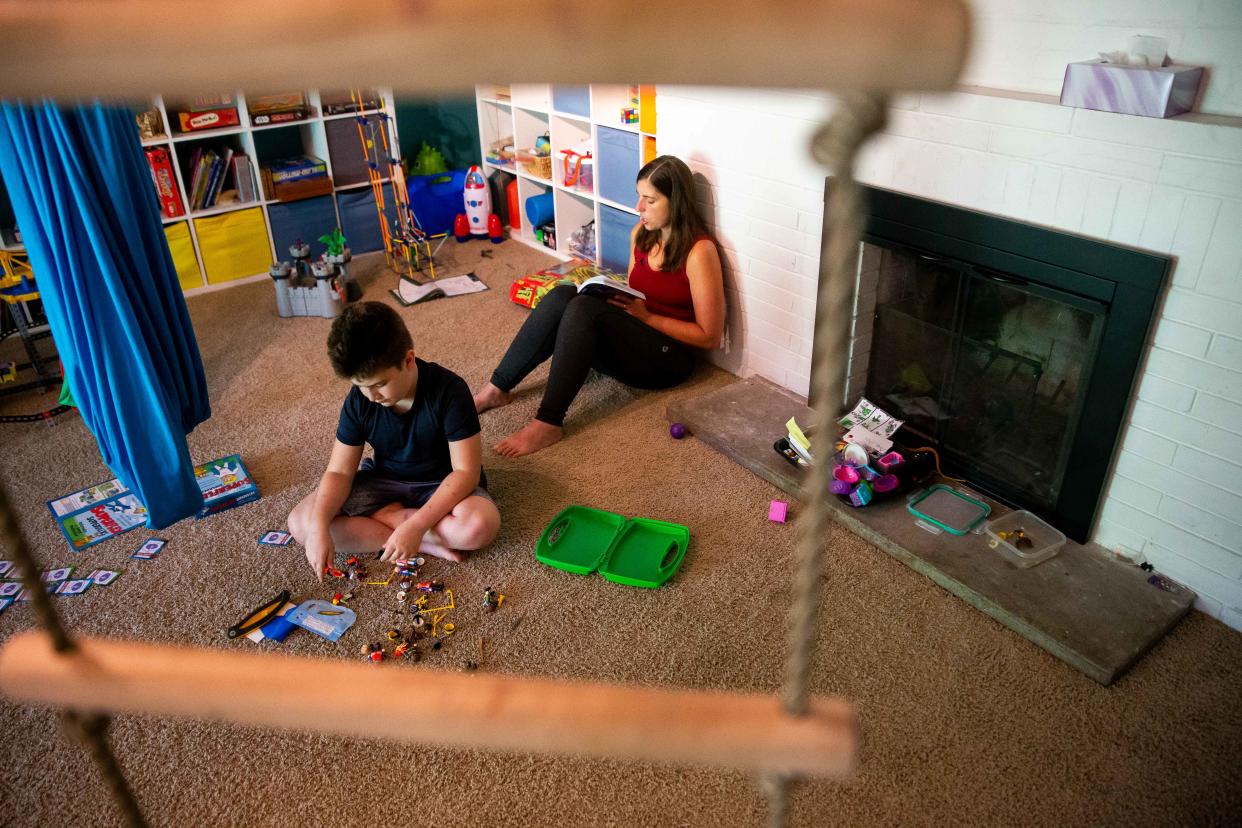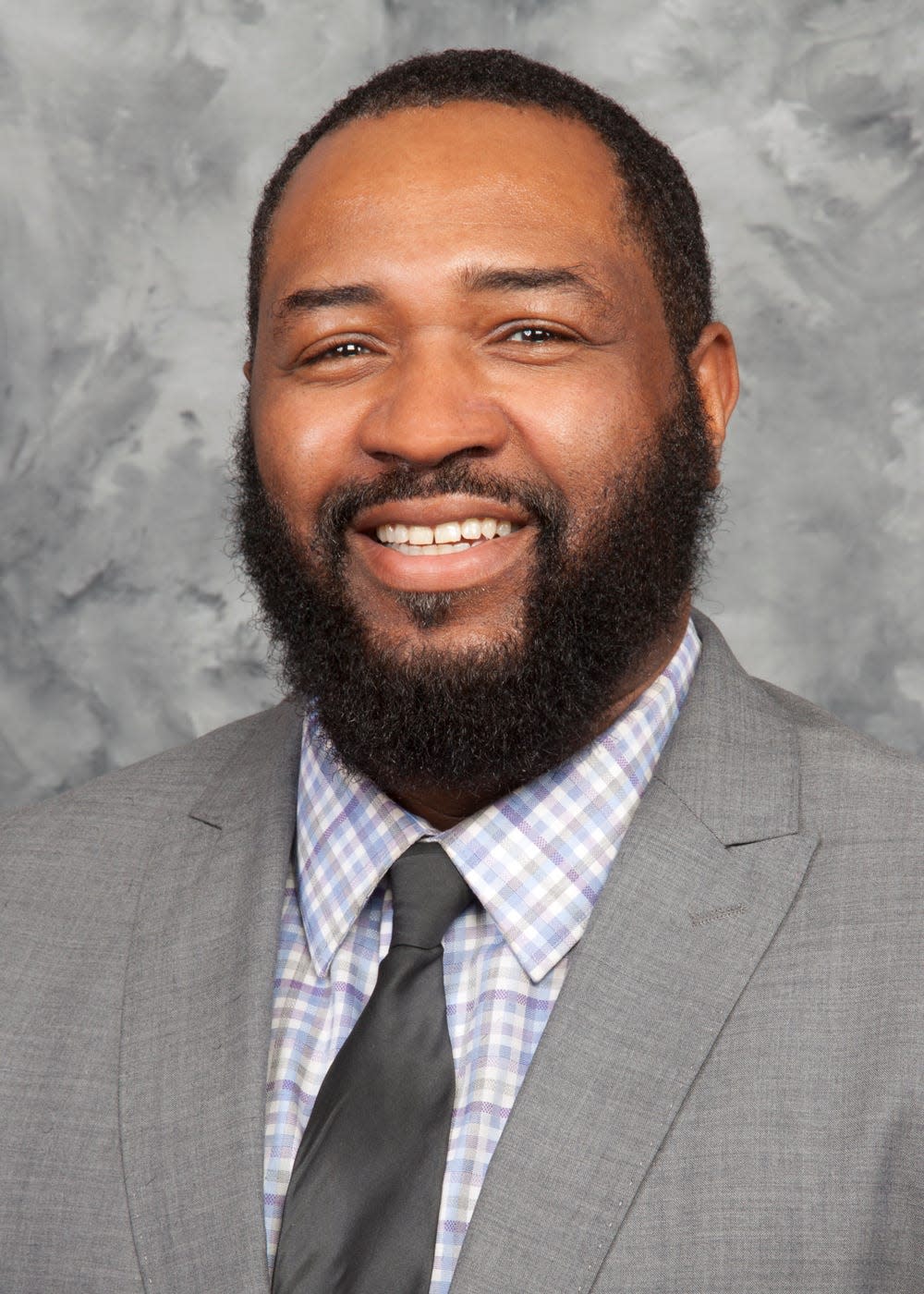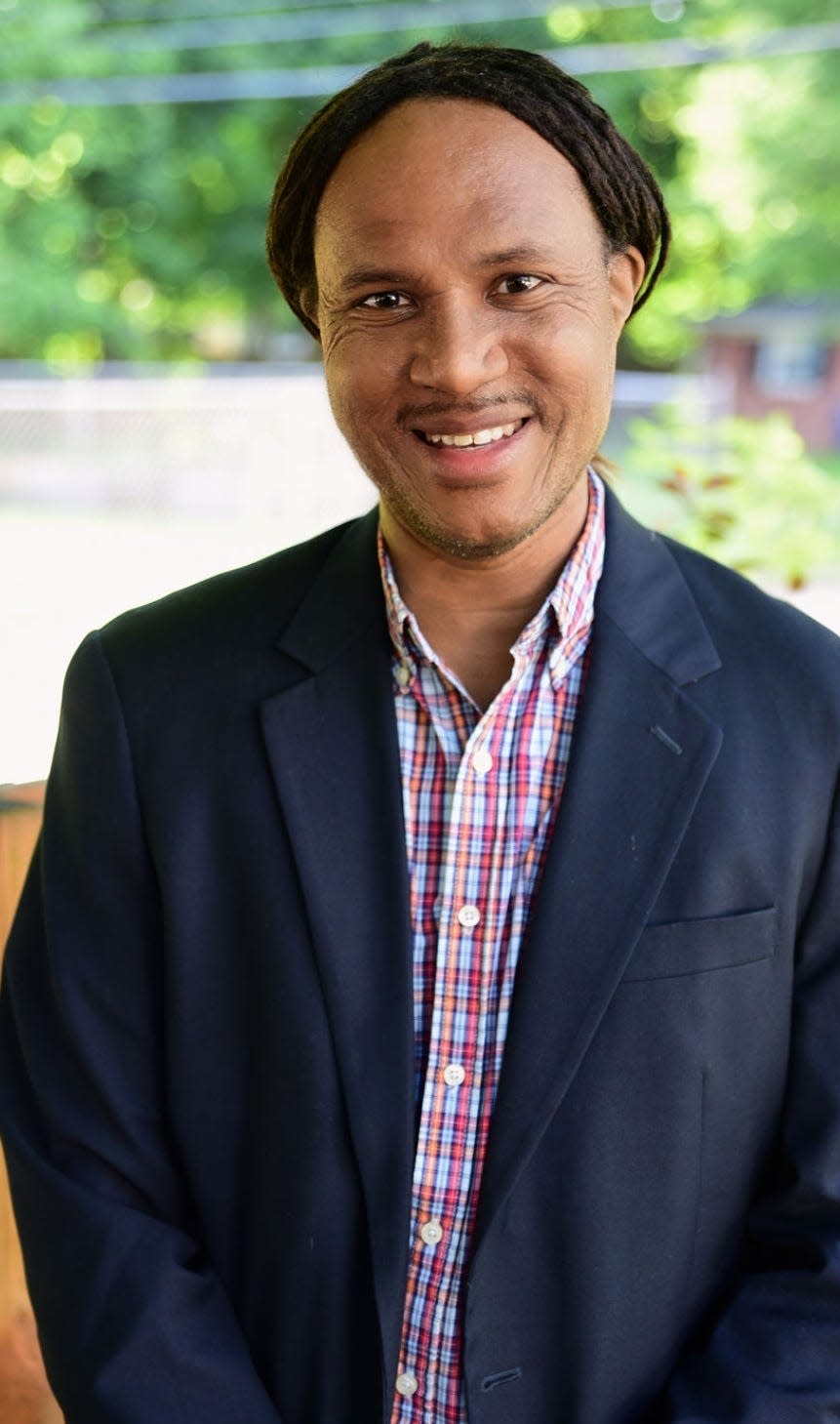Staffers at Grayling juvenile justice center suffer bites, broken bones — and fear worse
A recent inspection of Michigan’s sole state-run juvenile justice facility for boys found dangerous conditions that employees have warned could lead to serious injury or death.
While state officials are cracking down on Wayne County for its troubled juvenile jail, the state itself has struggled with similar issues of understaffing and violence at Shawono Center in Grayling that have put employees at risk, a Free Press investigation shows.
So much so that the Michigan Department of Health and Human Services, which runs the northern Michigan facility, was fined $40,000 for workplace safety violations in December 2023 after an investigation found employees weren’t kept safe from youths’ violent behavior and incident records were incomplete. Staff injuries included sprains, bruises, broken bones and bites, according to a copy of the investigation performed by the Michigan Occupational Safety and Health Administration.
Shawono Center is one of just two state-run juvenile justice facilities in Michigan and can house up to 40 youths up to age 21 who are sent there by courts for treatment after their criminal cases have concluded. Its residents include young males with murder, rape and felony assault convictions as well as those with severe mental health issues and autism.
“I fear that we are on borrowed time, and if there is no change, we will be facing a very real possibility of a future riot that includes multiple injuries, potential sexual assault and even possible death,” one unnamed Shawono employee wrote in the June 2023 workplace safety complaint to MIOSHA. “We need help.”
State officials are contesting the MIOSHA citations and fines.
Workplace investigation confirms staff are in danger
Critics and experts say the safety problems at Shawono reflect a crisis in the juvenile justice system statewide. A lack of facilities and understaffing have left these centers ill-equipped to treat some of the most troubled young people in Michigan.
At Shawono, the MIOSHA investigator found that from 2021 to 2022, youth assaults on staff caused 20 recordable injuries and caused employees to miss more than 1,400 days of work. Staff deployed riot gear twice in February 2022 alone.
The investigation didn’t capture more recent incidents: Last winter, residents tore down the fire suppression system, flooded the unit, broke all the glass they could reach and destroyed furniture and televisions in the community area, according to Nicole Knight, whose son has been living at Shawono for around 15 months.
MIOSHA’s investigation, which the Free Press obtained through the Freedom of Information Act, led to a citation that said MDHHS failed to protect staff from “workplace violence that was causing or likely to cause death or serious physical harm.”
MDHHS said it was "deeply committed" to ensuring the health and safety of both youths and the staff who care for them in facilities such as Shawono.
"We have implemented a range of measures to assist staff with these vital jobs, including ongoing training in verbal deescalation, behavioral intervention, safety and security protocols, and the appropriate use of restraints and seclusion practices," spokesperson Lynn Sutfin wrote in an email on March 28.
"Protecting the safety and well-being of young people in our care and the committed staff that serve them is our top priority at MDHHS," she wrote.
Staff struggle with new restraint and seclusion rules
The $40,000 in fines is not the only sign of problems at Shawono.
MDHHS could also soon downgrade its own license to run the facility after an investigation by its child welfare licensing department found Shawono employees committing violations: Staffers broke rules in December 2023 when they held a youth on his stomach for four minutes before handcuffing and putting leg shackles on him, according to the state report.
That violation is significant because Michigan banned the practice of restraining youth on their stomachs following the 2020 death of 16-year-old Cornelius Fredericks. He died after being held down on his back by seven staff members at a private youth facility for throwing a sandwich.
In the wake of his death, the state also made other restrictions to how youths could be restrained. And it banned seclusion — the practice of putting a youth alone in a room — though it issued rules variances to some facilities including Shawono that allowed it under certain circumstances.
Shawono, which is subject to the same policies as other child-caring institutions, may now use restraint only “as a lifesaving response,” using an approved technique. Thanks to a rule variance issued Feb. 12, staff there may also use seclusion, but only "as a temporary response to prevent life-threatening injury or serious bodily harm when other interventions are ineffective." Other conditions apply as well: Seclusion has to be authorized, can't take place for fixed periods and must end within two hours, among other rules.
When restraints or seclusion are deployed, a licensing investigation often follows, a practice that employees said has had a chilling effect on their willingness to engage with residents at all.
Juvenile advocates say the policy changes were necessary to keep kids safe.
But employees at Shawono and other facilities statewide say the new rules have gone too far, leaving them vulnerable to assault by out-of-control residents and subject to heavy scrutiny by state investigators who offer few alternatives to putting hands on youth.
“I really think that once the kids figured out that we could not do a restraint until something huge happens, they took advantage of that,” said former employee Matthew McKelvey. “They would do everything they could possibly do to get what they want.”
Between the Crawford County Sheriff’s Department and the Michigan State Police, law enforcement was called to Shawono 163 times from 2018 to October of 2023 to deal with “unruly individuals” or for medical issues. The Crawford County Prosecutor’s Office confirmed that over the past year, at least three adult residents have been charged with assault.
“You’ve got kids that they're not prepared to handle physically and mentally, you’re short staffed — everybody’s working multiple shifts or overtime, you have these rules where someone could come up and punch the staff right face and break their nose, and you can't lock them up,” said Dave Baker, who previously served as a youth specialist at the now-closed Maxey Training School, and as president of the union representing state employees. “Now you have no control.”
Parents and advocates worry Shawono’s kids aren’t safe either
While staff are elevating their own safety concerns, parents and advocates say escalating violence at the facility — and physical responses by staff — is endangering kids as well. Shawono staff have improperly restrained and secluded youth several times over the past year and did not document and report these incidents correctly, according to the licensing investigation.
Safety comes first, Knight said; she agreed that sometimes restraining a youth might be necessary to avoid injury to residents or staff. But she worried about her own son’s safety in a place where he’s been restrained “multiple times,” as well as locked in his room.

“They need to be one-on-one supervised if they’re going to be secluded like that, because those are the opportunities that my child has had to try to strangle himself with things in his room,” said Knight. “You can't leave a kid that's in that much distress completely by themselves and unsupervised. That's not safe.”
MDHHS’s Division of Child Welfare Licensing recommended the center be placed on a second provisional license and required Shawono leaders to submit a corrective action plan after the incident late last year in which a resident was wrongfully restrained on his belly for four minutes, then locked in his room even after he had calmed down.
Staff members involved in the improper restraint told the investigator they continuously tried to flip the youth to his back but that he was kicking and fighting too much for them to do so. Video footage of the incident did not show him struggling, according to the investigation.
Cassie Atallah, co-founder and co-leader of Michigan Advocates to End Seclusion and Restraint, reviewed the incident report and said she was struck by the discrepancies in what staff reported happened versus what the resident recalled — and what a description of the video footage corroborated.

“It sounds like this kid was handled in an unsafe, unlawful and traumatizing way for being angry,” Atallah wrote in an email to the Free Press.
She said a system like the one used at Shawono provokes youth and escalates incidents in a way that leads to restraint or seclusion if nothing better has supplanted it.
“When we take away seclusion and restraint, we need to replace them with trauma-informed, neuroscience aligned, relationship-based, collaborative models that prevent the crisis situations that tend to make staff feel like they need seclusion and restraint,” Atallah wrote. “It sounds like, when seclusion was outlawed and restraint was restricted, this facility kept the archaic models that made these tactics necessary.”
MDHHS is following the investigator’s recommendation to place Shawono on a second provisional license for six months. During that time, the Division of Child Welfare Licensing will be on-site weekly to help bring the center into compliance. The center’s current license expired April 1.
Staff shortages and vacancies have taken a toll
Shawono employees previously pleaded for help directly to MDHHS through a union grievance in June 2023 that the Free Press obtained through FOIA.
The 17 signatories wrote that they were working under hostile and unsafe conditions without the training and tools to protect themselves from youths kicking and punching them, spitting on them, throwing urine and feces at them, using racial slurs and making threats.
They pointed to a lack of staff — especially medical and mental health professionals — and the limitations on restraint and seclusion as major factors in creating a constant threat of violence.
While Shawono’s website says it accepts only youth with “mild to medium” mental health issues, current and former staff confirmed the center is housing four or five youth with severe mental health needs that cannot be managed with current staffing. Current Shawono staff members spoke with the Free Press on condition of anonymity, fearful of retaliation from supervisors.
As of March 29, two of the five youth group leader positions are unfilled, there is no clinical social worker on staff, and the program manager position stands vacant. Shawono employees say the lack of leadership is palpable.
“You have two facilities,” Knight said. “Invest in them. Make it right.”
MDHHS said it had increased staffing levels at Shawono by adding youth specialists, a youth aide and a registered nurse, and by contracting with additional youth care specialists and county workers. Shawono employees said adding county workers didn't help staffing since outside workers have to be accompanied by current staff members for their safety, negating the benefit.
A statewide problem, with potential for reform
With both county- and state-run facilities struggling to deescalate youth behavior and keep kids and staff safe, center leaders called on MDHHS to reevaluate its policies on seclusion.
A letter from Juli Reynolds, president of the Michigan Juvenile Detention Association, to Demetrius Starling, executive director of the department’s Children’s Services Agency, said the most recent seclusion rule appears to have been “written without consideration of the many youths in care who display violent, unpredictable behavior and the critical impact their actions have on those around them.”

The association said that removing facilities’ ability to separate youth from others was “short-sighted and dangerous,” and that removing the option to seclude youth would likely result in the increased use of restraint — and with it, the accompanying risk of physical and mental injury to youths and employees.
Reynolds said her letters, sent in August 2023 and again three months later, did not receive a response.
Reynolds agreed that the use of restraint must be limited; she remembered seeing a disobedient kid hogtied to his bed on her first day of work at a juvenile center back in 2007. “I do understand why they’ve done some of the things they do,” Reynolds said,” but they’ve gone so overboard.”
As far as Reynolds knows, no other state has prohibited the use of seclusion in juvenile facilities.
MDHHS told the Free Press on March 4 it might reconsider its restraint and seclusion policies.
“MDHHS is exploring opportunities to reduce the complexity of the licensing oversight and maintenance process and has invited partners including Wayne and Macomb counties to participate in this process,” Sutfin wrote in an email.
The state also “strongly supports” Senate Bill 227, which would allow staff at child-caring institutions functioning as psychiatric residential treatment facilities to use physical restraint and seclusion for up to 30 minutes in an emergency, but would require a physician to authorize it as soon as it begins. That bill was approved by the Legislature in late 2023, but was revisited early this year and did not pass.
Jason Smith, director of the Michigan Center for Youth Justice, argued that rather than trying to legislate the way to better restraint policies, the state should change how youth in residential facilities are treated — and make sure as few youths as possible end up in one.

He said ensuring regular access to high-quality mental health services, educational and recreational opportunities and family contact would help youth feel supported and cared for — and less likely to act out.
“It's vital that staff are clinically skilled and consistently trained in deescalation strategies to effectively serve the youth under their care, especially those with significant behavioral health needs,” Smith wrote in an email to the Free Press. “By creating a supportive and positive environment that reduces stressors, we can minimize behaviors that might lead to the use of restraint.”
The proposed state 2025 budget includes one-time funding of $5 million to be used for capital investments and updates to the facilities, including technology upgrades and updated recreation areas, according to MDHHS.
Smith said Michigan’s goal should be to transform its statewide out-of-home placement system to be smaller, more individualized and safer.
Jennifer Brookland covers child welfare for the Detroit Free Press in partnership with Report for America. Make a tax-deductible contribution to support her work at bit.ly/freepRFA. Reach her at jbrookland@freepress.com. Submit a letter to the editor at freep.com/letters.
This article originally appeared on Detroit Free Press: Shawono workplace violence investigation reveals dangerous conditions
